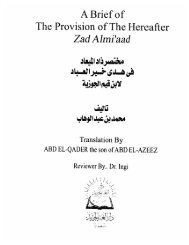Create successful ePaper yourself
Turn your PDF publications into a flip-book with our unique Google optimized e-Paper software.
WELCOME TO ISLAM !<br />
Our New Muslim Brother/Sister<br />
In this “<strong>First</strong> <strong>Aid</strong>” kit, as we may call it, we would like to share with you certain basic<br />
information needed at this stage of your stepping into Islam. You will learn more and<br />
more about this ennobling religion as you consciously grow as a Muslim.<br />
But before we proceed, we have a few words for you.<br />
A. Islam is the greatest blessing that Allah has bestowed upon you, guiding you to the<br />
right path. It is indeed a matter for rejoicing.<br />
Those whom Allah wills to guide, He opens their hearts to Islam. (The Qur’an, chapter 6 : verse 126)<br />
Say, Allah’s guidance is the [only] guidance, and we have been directed to submit ourselves to the<br />
Lord of the worlds (i.e., to be Muslim). (6:71)<br />
Say: “In [this] bounty of God and in His grace let them rejoice; it is better than all [the worldly<br />
wealth] that they may amass!” (10:58)<br />
There are many people in the world who may be well-off by worldly standards, but<br />
who are indeed unfortunate to miss this blessing. Certainly, in the absence of<br />
guidance from the Creator, man becomes worse than an animal.<br />
Verily, the vilest creatures in the sight of God are those who are bent on denying the truth ... (8:55)<br />
B. According to the Islamic understanding, a person does not “convert” to Islam, since<br />
everyone is “Muslim” at birth -- submitting to God’s will. You are rather a “revert”.<br />
This means that your embracing Islam is, in fact, your coming back home. Prophet<br />
Mohammed (pbuh) has said:<br />
Every child is born in a natural state [of submission]; it is only his parents that later turn him<br />
into a Jew, a Christian or a Magian. (Saying of Prophet Mohammed - peace be upon him1 - as<br />
reported by Bukhari & Muslim)<br />
C. Embracing Islam also means that you have started a new life, with a clean slate. All<br />
your past sins and mistakes are forgiven by Allah, the Ever-Forgiving, the Most<br />
Merciful. You will be measuring yourself by a new standard and conforming your life<br />
to a new model.<br />
Say to the unbelievers, if [now] they desist [from unbelief], their past [actions] will be<br />
forgiven. .. (8:38)<br />
If a person embraces Islam sincerely, then Allah will forgive all his past sins, and after that the<br />
reward of his good deeds will be ten times to seven hundred times, and an evil deed will be<br />
recorded as it is - unless Allah forgives it. (Reported by Bukhari)<br />
D. If you have come across some people in the Muslim community who behave contrary<br />
to the teachings of Islam, you may be wondering: if Islam is a true religion for<br />
mankind, then why are its followers not all exemplary people?<br />
1 Muslims use the phrase “peace be upon him” (pbuh) at the mention of every Prophet’s name to<br />
express their respect and reverence to them.
Remember that religion and its principles are one thing, and the people and their<br />
behavior are another. For a sincere seeker of truth, it is the principles and teachings of<br />
Islam that should matter, rather than certain peoples’ behavior. If somebody driving a<br />
Rolls Royce car causes an accident, you cannot blame the Rolls Royce Co. or the car;<br />
it is the driver who is to be held responsible.<br />
There are bad people among Muslims, as there are in all other societies in the<br />
world. Muslims are also human and possess all human weaknesses. Lack of proper<br />
religious knowledge and the influence of a materialistic environment around them<br />
make their faith weak, or faith may even disappear from their hearts. They will<br />
certainly be answerable to Allah for their misguided ways in life. Their Muslim<br />
name or claim does not necessarily match what is in their hearts or in their behavior.<br />
Nobody has a monopoly on Islam. As a new Muslim you may be far superior to<br />
many whose families have been Muslim for generations but lack Islamic character.<br />
Maybe you can lead them back to the path of righteousness.<br />
E. By accepting Islam, you display a conviction of having discovered the Truth and<br />
having found the road to salvation. Nevertheless, it does not necessarily mean that<br />
your worldly life will become nothing but a bed of roses. One may encounter some<br />
difficulties and hardships while adhering to Islam. These are in fact the trials<br />
through which Allah tests the believers for their sincerity in faith. These tests,<br />
however, do not last forever; one who shows patience and endurance with full trust in<br />
Allah, comes out of them successfully, as a better person, with a stronger faith.<br />
And most certainly shall we test you with something of fear and hunger, and loss of worldly<br />
goods, of lives and of the fruits [of your toil]. But give glad tidings to those who are patient<br />
in adversity; who, when calamity befalls them, say: ‘Verily, to Allah we belong, and to Him is<br />
our return.’ They are those on whom [descend] blessings from Allah, and [His] mercy, and<br />
they are the ones who are on the right path. (2:155-157)<br />
So whenever you come across hardship, do not lose heart. Instead, remember Allah,<br />
put full trust in Him, be steadfast, and sincerely ask for His help. Ultimately, you will<br />
realize that your difficulty was a blessing in disguise.<br />
F. If you were CHRISTIAN before, do not think that by accepting Islam you have<br />
“changed” your religion; rather you have purified your faith and have understood it in<br />
the right perspective. Moving from Christianity to Islam is thus a fulfillment and<br />
completion of faith. Consider what Jesus (pbuh) is reported to have said (referring to<br />
Prophet Mohammed - pbuh):<br />
I have yet many things to say unto you, but you cannot bear them now. But when he, the spirit<br />
of truth is come, he will guide you into all truth; for he shall not speak of himself; but<br />
whatsoever he shall hear, that shall he speak, and he will show you things to come. He shall<br />
glorify me, for he shall receive of mine and shall show it unto you. (Bible, John 16:12-14)<br />
And I shall pray the Father, and He shall give you another Comforter, that he may abide<br />
with you for ever. Even the spirit of truth; ... (Bible, John 14:16-17)<br />
If you were HINDU or BUDDHIST before, know that you have now recognized your<br />
Creator in the correct and original concept, that which had been lost with time, and<br />
know that God speaks to you directly and clearly in the Qur’an and in the example of<br />
Prophet Mohammed (pbuh), with no intermediary between you and Him.
G. You may have noticed that faith sometimes fluctuates from one time to another<br />
(becomes stronger and weaker), depending on the environment. Faith needs protection<br />
and care (as does an infant or a tender plant, for example). It is important for you to pay<br />
attention to keeping it strong. This you can achieve if you<br />
- keep the company of good practicing Muslims, and avoid those who are<br />
mainly interested in materialism,<br />
- be regular in offering all the obligatory prayers (salah).<br />
God is always 100% ready to help you even in the weak moments of your faith. So<br />
you must never feel shy to ask from God, and never consider yourself not good<br />
enough.<br />
H. Last but not least, you need to grow in Islam by always being keen to acquire new<br />
knowledge and, of course, by putting it into practice. Learning is a continuous<br />
process in life. Never hesitate to ask questions to clear your doubts or to increase your<br />
knowledge; ask the most knowledgeable persons.<br />
To seek knowledge is a sacred duty of every Muslim. (Reported by Ibn Majah)<br />
If anyone goes on his way in search of knowledge, Allah will thereby make easy for him the<br />
way to Paradise. (Reported by Tirmidhi)<br />
________<br />
3<br />
2. THE GATEWAY TO ISLAM<br />
LA ILAHA ILLA ALLAH, MOHAMMADUN RASOOL ALLAH<br />
A Muslim enters the fold of Islam by believing with the heart and declaring with the<br />
tongue two creedal statements:<br />
• There is none worthy of worship except Allah (the One and Only True God) and<br />
• Mohammed is the Messenger of Allah.<br />
This Islamic creed is called “Shahadah” -- the Declaration of Faith. The Arabic text of this<br />
pronouncement and its meaning are as follows:<br />
ASH-HADU :<br />
AN :<br />
LA :<br />
ILAHA :<br />
ILLA :<br />
ALLAH :<br />
WA :<br />
ASH-HADU :<br />
ANNA :<br />
MOHAMMEDAN :<br />
RASOOL-ALLAH :<br />
I testify<br />
that<br />
not ; in this sentence it means "there isn't"<br />
any being worthy of worship and devotion, i.e., a god<br />
except<br />
the One and Only True God; “Allah” is God's personal name<br />
and<br />
I testify<br />
that<br />
Mohammed = name of the last and final prophet of God<br />
(literal meaning: “the praised one”)<br />
the messenger of Allah;<br />
Rasool : one who conveys the message
The statement of Shahadah has some deeper meanings. It implies:<br />
- Rejection and denial of all notions and concepts which ascribe (in any form or degree)<br />
any partner or sharer in Allah’s divinity, lordship and authority, or in His attributes, or<br />
in His worship.<br />
- Acceptance of Allah’s authority and commands wholeheartedly.<br />
- Willingness to organize life in accordance with Allah's guidance.<br />
- Affirming faith in all the Messengers and Prophets of Allah, the last and final<br />
being Mohammed (peace be upon him).<br />
- Accepting that a meaningful life in this world, and Salvation in the next life<br />
can be attained only through following what Allah has revealed & inspired<br />
to Prophet Mohammed (peace be upon him).<br />
- Willingness to follow the way shown by Prophet Mohammed (pbuh).<br />
The saying of the Shahadah is not simply a ritual utterance as an entrance to Islam,<br />
nor is it a one-time event made before an Islamic court of law (or other reliable witnesses).<br />
It is a statement of belief to be contemplated and remembered repeatedly as the Muslim<br />
gains insights into his/her life and his/her experiences of the created world around<br />
him/her. It is, in effect, a statement of a covenant or a promise to God, or a<br />
commitment to a total self-surrender to God’s will. One who declares this, is expected to<br />
carefully monitor his/her thoughts and bring his/her actions in line with Islamic standards.<br />
The Islamic Faith rests on the following Fundamental Beliefs:<br />
4
1. Belief in the One and Only God, the True God (called Allah in the Arabic<br />
language), who alone is the Creator, Sustainer and Lord of all that exists. There is<br />
none like unto Him, or comparable to Him.<br />
He is loving, merciful, kind, just, and forgiving. He is transcendent, yet very near to<br />
man, to be addressed directly without any intermediary. He alone deserves worship,<br />
adoration, totalobedience, and He alone can appreciate or receive our absolute love and<br />
gratitude. His pleasure alone is worth seeking, and His displeasure alone is worth fearing.<br />
2. Belief in all the Messengers/Prophets of God, raised up in different parts of<br />
the world, at different times, to call their people to the path of God. The last and final<br />
among them was Prophet Mohammed (pbuh), who lived in Arabia. He was sent to<br />
make known the correct concepts of God's guidance for all mankind.<br />
Jesus (pbuh) was also a mighty messenger of God; he was sent, as he himself<br />
claimed, to the Children of Israel.<br />
3. Belief in the Books/Scriptures revealed by God to His Messengers,<br />
notably, the Gospel (revealed to Jesus - pbuh) and the Torah (revealed to Moses - pbuh).<br />
The last and final among them was the Qur’an. This is the only Book of divine<br />
guidance available to mankind in a complete, and unchanged original form.<br />
4. Belief in the Hereafter (life after death, the Day of Judgment, accountability<br />
before God for our beliefs and actions in this world, Heaven and Hell as the final abode).<br />
5. Belief in the Angels, the spiritual and splendid creatures of God, invisible to us,<br />
who carry out various duties assigned to them by the Creator, with absolute obedience.<br />
One among them is Gabriel, who has brought the revelation to the prophets of God.<br />
6. Belief in God’s all-wise, all-powerful decree. Whatever happens in the<br />
universe and in the life of man, is not by chance, but by a divine will and purpose.<br />
Man's free choices and the outcome of these are in the fore-knowledge of God.<br />
One must remember that these beliefs are not evolved by human minds; these are not<br />
theories, mythologies, or philosophies developed by wise men. These are truths and<br />
trustworthy concepts which are conveyed by God Himself. Therefore, denial of them<br />
amounts to denial of Truth, or denial of God.<br />
________________________________________________________________________<br />
SOME IMPORTANT ISLAMIC TERMS:<br />
Iman (Eemaan) : Faith, belief<br />
Tawheed : Oneness and uniqueness of God, the correct concept of God as taught by all the Prophets<br />
Risaalah : Prophethood, the channel of communication of divine guidance to mankind<br />
Aakhirah : The Hereafter, one of the Unseen Realities<br />
Shirk : (shi is pronounced as in ship.) Ascribing a partner or sharer in God’s divinity, lordship,<br />
authority, attributes and worship; any deficiency in tawheed amounts to shirk.<br />
Islam : Self-surrender to God, submission to God’s will (willingly, lovingly); peace (through submission)<br />
5
3. THE FOUNDATION OF RELIGION<br />
Islam is a religion of both faith and action. One without the other is incomplete.<br />
Thus, in a Muslims’s life, faith is reflected in his actions or practices. Among these<br />
practices there are certain acts of worship which are obligatory and basic to the Islamic<br />
teachings and way of life. These are known as the Five Pillars of Islam.<br />
1. The declaration of faith (shahadah )<br />
2. The five prescribed daily prayers ( salah )<br />
3. Fasting ( sawm ) during the month of Ramadan (the 9th month in the Islamic lunar<br />
calender), which involves total abstinence from all food, drink, and marital relations through<br />
-out thedaylight hours, as well as refraining from falsehood and wrong behavior of any sort.<br />
It is a training period for self-discipline, spiritual attainment, and of compassion and charity<br />
towards others.<br />
4. The poor-due or alms-giving (zakah ), once a year, if one has savings or<br />
property on which a taxable amount can be assessed, according to certain rules. It is a means<br />
of materializing brotherly ties in the society.<br />
5. The pilgrimage ( hajj ) to Makkah once in a life-time, for those who can afford it<br />
materially and physically.<br />
It is a re-enactment of the test to which Prophet Abraham was put, and of a dress rehearsal<br />
for the coming Day of Judgment. It takes place in the second week of the 12th month in the<br />
Islamic calender.<br />
One must remember that God’s majesty and glory do not depend, in the slightest<br />
degree, upon our worship, for He is absolutely independent of His creation, and is free of<br />
all needs. Rather it is we who need these forms of worship.<br />
general<br />
These acts of worship are meant to help us to:<br />
- develop God-consciousness in practical terms,<br />
- strengthen our faith, rationally and emotionally,<br />
- put our choices into perspective and discipline our life, and<br />
- reinforce the ties of brotherhood and affection among fellow humans in<br />
and with fellow Muslims in particular.
7<br />
STARTING SALAH<br />
Salah is the Islamic prayer that is offered as a prescribed ritual. Next to affirming<br />
the faith, a Muslim’s first and foremost duty is to offer the five obligatory prayers in their<br />
specified time slots. One who establishes regular prayer, establishes the religion, but one<br />
who ignores the prayer pulls down the very structure of the religion. It is the dividing line<br />
between Islam and non-Islam.<br />
Through salah a person communes with his Lord, the Creator and Sustainer of the<br />
universe. It is the noblest expression of faith in Allah. It is not simply a mechanical,<br />
verbal and physical exercise, but salah involves focussed concentration, attention and the<br />
presence of heart.<br />
Salah has a form and a spirit; its form is the worship with the body, and its spirit is<br />
the worship with the heart. Through the bodily postures of the prayer (standing, bowing,<br />
prostrating, and sitting) the Muslim expresses his feelings of submission, humility, and<br />
creatureliness before the Creator, while his heart is filled with the consciousness of the<br />
majesty, glory, greatness and beneficence of the Lord, a love for Him, and a fear of His<br />
displeasure.<br />
Salah is the spiritual food of a believer. It comforts his soul, purifies the heart, brings<br />
inner peace, and draws courage, hope and confidence in adversity. It generates discipline<br />
and will power, guides his attention to an upright way of life, and safeguards against<br />
indecency and evil inclinations.<br />
... Indeed, salah restrains from shameful and unjust deeds; ... (29:45)<br />
Performing salah regularly serves as a reminder to the Muslim during the day and night of<br />
his relationship with his Creator, and his position in the scheme of creation. Leaving aside<br />
salah, therefore, amounts to losing the most important and precious thing in ones’s life --<br />
one’s perspective and sense of relatedness to his Provider.<br />
Helps on performing salah<br />
Refer to the chart which illustrates ablution (wudu) and salah. The accompanying<br />
tape will be of further help for correct pronunciation, rhythm and fluency.<br />
The language of the ritual prayer is Arabic, because it is the language of the “words of God”<br />
-- the Qur’an, which is to be recited in salah. Any translation of the Qur’an is but an explanation<br />
of its meaning; it cannot be the “words of God”. Therefore, immediately after embracing Islam, it<br />
becomes essential for a new Muslim to start learning the prayers and some short surahs (chapters)<br />
of the Qur’an in Arabic. The first thing to memorize is surah al-Fatihah (the first chapter of the<br />
Qur’an), which is the most essential component part of salah.
You should start offering salah even if you have not memorized its wordings. Until the<br />
time you have memorirzed them, you should remain in each particular position/posture, and<br />
repeatedly say the simple phrases of glorifying Allah: Subhan Allah, Alhamdu lillah, Allahu<br />
Akbar, La ilaha illa Allah, for the duration of that posture. When you have finished your salah<br />
you can include any praise or requests said in your own language. Ultimately, the extra prayers<br />
uttered during the salah, must be in Arabic.<br />
___________________________<br />
Subhan Allah : Glory be to God (How perfect is God!)<br />
Alhamdu lillah : Praise be to God (All thankful praise is rightly due to God!)<br />
Allahu Akbar : God is the Greatest (God is greater than all else!)<br />
La ilaha illa Allah : There is no deity apart from God!<br />
8
4. THE PRIMARY SOURCES<br />
OF<br />
ISLAMIC TEACHINGS<br />
The Qur’an is the primary and fundamental source of all teachings of Islam. Since<br />
nothing can be more reliable than what the Creator of the universe Himself says, then<br />
anything -- whether an idea, a concept, a teaching, or an action -- that in fact goes against<br />
the Qur’an is not acceptable from the Islamic point of view.<br />
The next, but equally important, source of Islamic knowledge is the Prophetic<br />
Traditions, contained separately in the authentic books of Hadith.<br />
The Qur’an<br />
The Qur’an, the Holy Book of Islam, is the literal “Word of the Almighty God”<br />
revealed to Prophet Mohammed (pbuh). It constitutes a restatement, correction,<br />
completion and perfection of the earlier divine messages. It is essentially a book of<br />
guidance for mankind, and existing in the form of a literary masterpiece contained under<br />
one cover.<br />
This is the Book; in it is guidance sure, without doubt, for all who are conscious of God. (2:2)<br />
The Qur’an was revealed to Prophet Mohammed (pbuh) through the agency of the<br />
angel Gabriel (Jibreel ). It was revealed, not as a complete book on one single occasion,<br />
but rather in stages, in numerous parts, over a period of about 23 years, starting from the<br />
40th year of the Prophet’s life and continuing up to his death. He was neither the author<br />
nor the compiler of the Qur’an. But he was the recipient of its text and its guardian, as the<br />
verses were stored in his memory. There is not a single word of the Qur’an which is the<br />
product of his mind, or which is expressed in his own wording.<br />
The Arabic text of the Qur’an, as we have it in our hand today, is exactly the same<br />
as was received by the Prophet (pbuh), 14 centuries ago, not a single word added or<br />
deleted. It was preserved during his lifetime not only by way of writing it down under his<br />
own direction but, first and foremost, by committing to memory the whole of it, on the<br />
part of his Companions. Ever since that time it has been preserved with uninterrupted<br />
continuity. The Qur’an affirms that God has Himself taken the responsibility for its<br />
preservation and protection against any corruption:<br />
It is We Ourselves who have, without doubt, sent down this message; and it is We who shall<br />
assuredly guard it [from all corruption]. (15:9)<br />
The Hadith<br />
Whatever Prophet Mohammed (pbuh) said, did, or approved of in action, is called<br />
Sunnah, and the report of it is called Hadith. The Prophet’s role was not simply to deliver<br />
God’s message to the people, but as the Qur’an explains, his mission included presenting<br />
himself as an example to be followed by the people. The life example of the Prophet is<br />
made available to all mankind in the recorded reports of hadith. Such a detailed and<br />
voluminous account of his life has been recorded and preserved that it has no parallel in<br />
human history.<br />
The importance of obeying the Prophet (pbuh) and following his teachings is evident<br />
from the Qur’anic instructions:
O believers! Obey God and obey the Messenger. ... (4:59)<br />
He who obeys the Messenger, obeys God. ... (4:80)<br />
He (i.e. Mohammed, pbuh) does not speak of his own desire; it is nothing but revelation sent down<br />
to him. (53:3-4)<br />
And verily in the Messenger of God you have a beautiful [pattern of conduct], for anyone whose<br />
hope is in God and the Final Day and who remembers God much. (33:21)<br />
10<br />
5. THE DO’S & DON’TS<br />
For fulfilling our needs in all aspects of life (physical, moral and spiritual) and for<br />
performing our function on earth as God-conscious human beings, Allah has provided us<br />
with a complete and comprehensive code of life.<br />
This code of life includes certain deeds which are enjoined upon us as obligatory (the<br />
do’s) and certain other deeds which are forbidden and regarded as sinful (the don’ts).<br />
These are listed in the following pages. (All other deeds fall in between the obligatory and<br />
forbidden categories; such are graded in regard to the degree of permissiveness, as ‘recommended’,<br />
‘neutral’, and ‘disliked’.)<br />
THE BASIS FOR BEHAVIORAL RULES<br />
Allah is the Creator and has the full knowledge and wisdom of what is good for His<br />
creatures and what is not. To make lawful and to prohibit anything is, thus, the right and<br />
prerogative of Allah alone. So, whatever He commands and whatever He forbids is not<br />
whimsical or arbitrary, but there is always some meaning, wisdom and purpose behind it,<br />
which may or may not be fully known to us. Since His laws and commands are based on<br />
the very principles of nature according to which man has been created, these are as<br />
practical in operation, as universal in application, as permanent, and hence as vital and<br />
binding for us, as are His natural laws for the physical universe.<br />
It is, therefore, not befitting for a believer to have his ‘own’ opinion or personal<br />
options but to accept and obey willingly and happily whatever is ordained by God or His<br />
Messenger.<br />
It is not befitting for a believer, man or woman, when a matter has been decided by Allah and His<br />
Messenger, to have any option about their decision; if anyone disobeys Allah and His Messenger,<br />
he is indeed on a clearly wrong path. (33:36)<br />
THE FUNDAMENTAL PRINCIPLES<br />
• Generally speaking, everything is permissible except that which is prohibited in the<br />
Qur’an and/or recorded in a sound hadith. This is because Allah has created all things<br />
essentially for man’s benefit and use, and hence unless something is specified as harmful<br />
or bad (physically, morally, intellectually or spiritually, for an individual or society),<br />
nothing is prohibited to us.<br />
It is He Who has created for you all that is on earth;... (2:29)
... Allah does not want to impose any hardship on you, but wants to make you pure, and to bestow<br />
upon you the full measure of His blessings, that you might be grateful. (5:6)<br />
• But in matters related to acts of worship, the reverse holds: nothing is permitted<br />
except that which has been taught and demonstrated by the Prophet (pbuh). This is<br />
because worship is due exclusively to Allah, and hence should be performed only as He<br />
allows and ordains for us.<br />
What! have they [set up] associates [in divinity], who have laid down for them a [religious] way<br />
of life which Allah has not permitted?... (42:21)<br />
• Anything that leads to or contributes in promoting a prohibited thing, is also<br />
prohibited. Islam closes all doors to prohibited things.<br />
... These are the bounds set by Allah; so do not even go near them. ... (2:187)<br />
________________________________________________________________________<br />
SOME IMPORTANT ISLAMIC TERMS:<br />
Halaal : the permitted or allowed<br />
Haraam: the prohibited or forbidden<br />
FAITH AND WORSHIP<br />
11<br />
A BRIEF LISTING OF<br />
THE REQUIRED & THE FORBIDDEN BEHAVIOR<br />
Adhering to the five pillars of Islam<br />
RELATIONSHIP WITH ALLAH<br />
MAN HAS A DUTY TOWARDS<br />
1. GOD<br />
2. OTHER HUMANS<br />
3. OTHER CREATURES<br />
4. SELF<br />
A. THE REQUIRED BEHAVIOR<br />
Duties Towards Allah<br />
1. Sincerity in faith, the most important and basic requirement<br />
2. Trust in Allah and hope in His mercy<br />
3. God-consciousness<br />
4. Repentance and turning to Him for forgiveness<br />
5. Supplicating to Him for fulfillment of needs and for favors
Duties Towards Humans<br />
PARENTS: Respecting, caring and showing kindness to them (even if they are non-Muslims)<br />
RELATIVES, NEIGHBORS, ORPHANS, & THE NEEDY:<br />
Treating them with kindness and helping them<br />
BELIEVERS: Treating them as brothers/sisters<br />
NON-MUSLIMS: Tolerance, and protecting their freedom to belief and worship<br />
SOCIAL MANNERS<br />
- Greeting<br />
- Cooperation<br />
- Modest behavior<br />
- Keeping a promise<br />
- Trustworthiness<br />
- Kindness<br />
- Forgiveness<br />
- Generosity<br />
- Justice<br />
GENERAL<br />
- Upholding sanctity of all human life<br />
- Respecting the property and possession of others<br />
- Respecting the honor and privacy of others<br />
- ‘Enjoining what is right and forbidding what is wrong’<br />
- ‘Calling the people to the way of the Lord’<br />
12<br />
Duties Towards Other Creatures<br />
1. Respecting our environment and preserving its balance<br />
2. Kindness to the creatures under our trusteeship<br />
(A) OUTER SELF<br />
Cleanliness and hygiene<br />
(B) INNER SELF<br />
Duties Towards Self<br />
1. Discipline and self-control<br />
2. Truthfulness, reliability and honesty in character and behavior<br />
3. Patience, perseverance and firmness against the odds and any evils<br />
4. Chastity and modesty<br />
5. Hard work
B. THE FORBIDDEN BEHAVIOR<br />
Related to Beliefs & Worship<br />
1. Shirk (i.e., associating anything or anyone with Allah in His divinity, in His lordship, and<br />
in our worship of Allah. This is the greatest of all sins.)<br />
2. Bid’ah (innovation in religion, i.e., adopting ways other than those taught by the Prophet - pbuh)<br />
3. Hypocrisy and showing off<br />
4. Giving up or neglecting the acts of worship<br />
5. Forgetting the fear of Allah and despairing of His mercy<br />
6. Following superstitions and myths<br />
7. Consulting and giving credence to fortune tellers<br />
8. Being involved in magic and sorcery<br />
Related to Humans<br />
PARENTS: Disrespecting, insulting, or showing harshness towards them<br />
RELATIVES: Cutting off relations with them<br />
Divorcing a wife without reasonable grounds, or dropping her support / ingratitude<br />
towards husband, wasting his provision<br />
Severing ties with a fellow Muslim, unjustly, or for prolonged periods<br />
SOCIAL INTERACTIONS<br />
1. Free mixing of men and women and any form of physical contact outside marriage<br />
(fornication, adultery, prostitution, homosexuality)<br />
2. Lying, cheating, dishonest dealing<br />
3. Stealing<br />
4. Failing to keep promises and trusts<br />
5. Bribery<br />
6. Slandering, reviling by nicknames, and mocking at others<br />
7. Backbiting, (gossiping)<br />
8. Spying, violating others’ privacy<br />
GENERAL<br />
1. Killing anyone, except when compelled in self-defense or in a righteous war<br />
2. Injustice, tyranny and oppression<br />
3. Revenge (willful transgression) and blood-feuding<br />
13<br />
Related to other Creatures
1. Torture and cruelty to animals<br />
2. Wanton destruction of nature<br />
A) OUTER SELF<br />
Related to Self<br />
FOOD & DRINK<br />
1. Anything that intoxicates and befogs the mind<br />
2. The flesh of an animal that has died a natural death, or that has been killed by<br />
strangling, beating, falling, being gored, or partly eaten by wild animals; that on<br />
which any name other than ‘Allah’ is invoked; blood, flesh of swine; anything that<br />
is<br />
harmful to health or body<br />
3. Consumption in large quantity leading to wastage or abuse of the body<br />
CLOTHING<br />
1. Dress that does not cover the body properly (in the presence of others): for men<br />
from<br />
navel to the knee, and for women entire body except the face and the hands<br />
2. Dress that is transparent or tight exhibiting the body figure<br />
3. Men wearing women’s dress and women wearing men’s dress<br />
4. Silk and gold for men<br />
EARNING A LIVELIHOOD<br />
1. Gaining wealth by gambling and games of chance, interest, bribery, immoral trades<br />
2. Working at places where prohibited things are promoted or done<br />
IN THE HOME<br />
1. Using gold and silver utensils<br />
2. Keeping statues<br />
3. Keeping dogs without necessity<br />
B) INNER SELF<br />
1. Arrogance<br />
2. Over-indulgence in physical appetite and luxuries<br />
3. Excessive love of wealth or possessions<br />
5. Jealousy and rancour<br />
6. Suspicion towards others<br />
C) GENERAL<br />
1. Things considered shameful<br />
2. Suicide<br />
3. Miserliness<br />
4. Wasteful spending or squandering of wealth<br />
5. Hoarding
15<br />
6. IN FACING HARDSHIP . . .<br />
If you are not in a position to meet all the requirements of an Islamic way of life at<br />
this stage, never let yourself feel discouraged. Do not think that any requirement is a task<br />
too hard for you to accomplish. A difficult situation may be a feeling, or a fear, that you<br />
are not able to follow certain rules simply because they appear tough, or unreasonable for<br />
your situation, or it may be a genuine impossibility.<br />
Consider the following points:<br />
1. A person who embraces Islam is like a new born baby, who has to grow with time.<br />
Performing certain duties or observing certain codes may appear difficult to you in the beginning,<br />
but once you venture to practice it, this feeling will give way to self-confidence.<br />
Swimming, for example, may appear difficult as long as you do not know how to swim; but once<br />
you start trying, you learn how to manage it and even enjoy it.<br />
As the heart becomes softer and more pliable, and the faith becomes stronger and more resilient,<br />
the attitude of readiness to do something becomes easier and easier.<br />
2. We must bear in mind that the One Who created man, is the same One who has prescribed<br />
the norms and values for him. Who else can know the strengths and weaknesses of man<br />
better than the Creator? Will He command anything that is beyond the capacity of man?<br />
...God puts no burden on any person beyond what He has given him... (65:7)<br />
Thus, the true Islamic behavior is not an unreachable ideal, but it is absolutely practical. Our model<br />
is seen in the exemplary life of Prophet Mohammed (pbuh) and imitated by his companions, and<br />
ever since has been amply demonstrated by individuals and societies all over the world. Therefore,<br />
the fear of not being able to follow the commands should not deter you from making honest and<br />
sincere efforts.<br />
3. We must also bear in mind that all commands of God have profound/deep purpose. They<br />
are meant tfor developing various elements of man’s multi-faceted nature - physical, moral and<br />
spiritual - and for maintaining a harmony and balance among them. It is, therefore, in our own<br />
interest that we should try to follow them.<br />
4. If there are certain commands which cannot genuinely be obeyed under certain circumstances,<br />
or due to reasons beyond one’s control, then in such cases Islam provides analternative.<br />
Thus, there is a flexibility in genuine hardship circumstances.<br />
...God desires for you ease; He desires not hardship for you... (2:185)<br />
... But if one is driven by necessity -- neither coveting it nor exceeding his immediate need --<br />
no sin shall be on him; for, God is Most Forgiving, Most Graceful. (2:173)<br />
5. God is well aware of the difficulties and compelling circumstances which any person<br />
faces while following His commands. God does not hold anyone accountable for what is beyond<br />
one’s means, capacity or control. On the other hand He gives immense reward for the forbearance<br />
and steadfastness demonstrated in such situations. When one tries to follow God’s path with<br />
patience and well-doing, God will provide the person a way out:<br />
... And whosoever keeps his duty to God, God will appoint for him a way out [of difficulty].(65:2)<br />
Thus, there is no need to remain frustrated, if you are not be able to keep your duty to God to its<br />
full extent. A committed person will not give up for fear of inability or repeated failure. As long<br />
as you are committed, and put forth sincere efforts, you will be rewarded by God and guided.<br />
Furthermore, God will make your path easy.
So be conscious of God as much as you can; ... (64:16)<br />
... And whosoever keeps his duty to God, He grants [him] ease out of his conditions. (65:4)<br />
... If anyone puts trust in God, sufficient is [God] for him... (65:3)<br />
______________________<br />
16


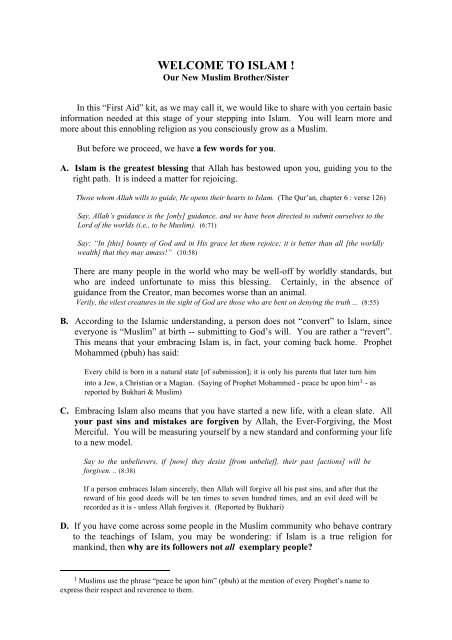


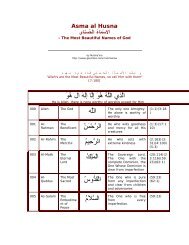

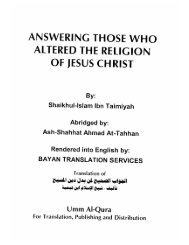


![Al-Quran - The Miracle of Miracles [ deedat]](https://img.yumpu.com/4137688/1/190x245/al-quran-the-miracle-of-miracles-deedat.jpg?quality=85)
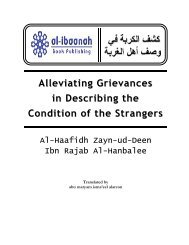
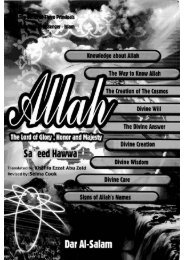
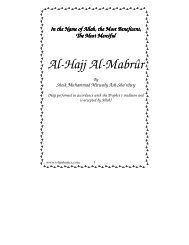

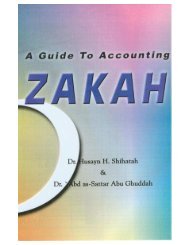
![A Collection Of Wise Sayings [ Al-Fawaid ].pdf](https://img.yumpu.com/4135801/1/190x245/a-collection-of-wise-sayings-al-fawaid-pdf.jpg?quality=85)
